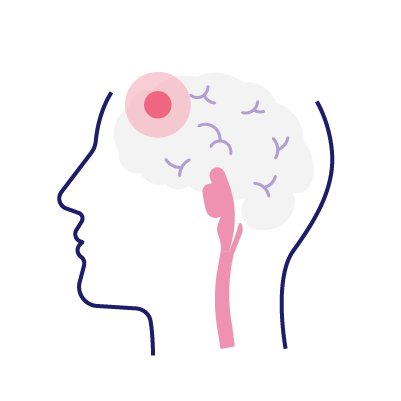zedoresertib (Debio 0123)
zedoresertib (Debio 0123) is a brain-penetrant, highly selective WEE1 kinase inhibitor. WEE1 is a key regulator of the G2/M and S phase checkpoints, activated in response to DNA damage, allowing cells to repair their DNA before resuming their cell cycle. WEE1 inhibition, particularly in combination with DNA damaging agents, induces an overload of DNA breaks. In conjunction with abrogation of other checkpoints such as G1, the compound pushes the cells through cell cycle without DNA repair, promoting mitotic catastrophe and inducing apoptosis of cancer cells. zedoresertib is currently in Phase 1/2 clinical research as monotherapy and in combination with different agents. It is being developed to respond to the high unmet needs of patients living with the burden of difficult-to-treat cancers.
Product Snapshot

Inhibition of Wee1 Kinase
Forced arrest of DDR leading to apoptosis
Being researched in:
- Solid tumors
- Glioblastoma
- CCNE1-amplified ovarian cancer
In short
Initially discovered by Almac Discovery before being licensed by Debiopharm, zedoresertib could prevent tumor growth by inhibiting Wee1 thereby disrupting DDR through the G2/M and S phase checkpoints
Ongoing Ph 1 clinical studies are investigating zedoresertib as monotherapy in solid tumors and in combination with SoC in selected tumor types including CCNE1-amplified ovarian cancer and glioblastoma
Focus on zedoresertib (Debio 0123) Mode of Action
Wee1 is a key regulator of the G2/M and S phase checkpoints, activated in response to DNA damage, that allow cells to repair their DNA before resuming the cell cycle. Inhibition of Wee1, particularly in combination with DNA damaging agents, induces an overload of arrests in the DNA damage response process. Also, in conjunction with the failure of other checkpoints, such as G1 controlled by p53, Wee1 inhibition pushes the cells through their cycle before DNA repair, promoting mitotic catastrophe and inducing apoptosis of cancer cells. The resulting impairment of the G2-M checkpoint prevents cancer cells from repairing DNA damage, favoring the enhancement of the effect of the DNA damaging therapy and potentially improving therapeutic outcomes.
Focus on DNA Damage Response
DNA damage response consists of all proteins and processes that ensure that the cell cycle does not progress with damaged DNA. Replication is a highly regulated process that guarantees the faithful duplication of the genome once per cell cycle, and any condition that compromises it is referred to as replication stress. Replication stress, characterized by DNA synthesis slow down and or replication fork stalling, is a major cause of genome instability and is linked to the development of tumor cells. Replication is not present in normal cells and as such targeting DDR offers new opportunities for drug development.

About Glioblastoma
Glioblastomas are fast-growing and aggressive brain tumors that can arise de novo or evolve from lower grade gliomas. GBM may be asymptomatic until it reaches a significant size. Aside from diagnostic challenges, nearly all GBM recurs, and effective treatment options are limited. The widely accepted SOC for patients with newly diagnosed GBMs consists of surgical resection, followed by radiation therapy with concurrent TMZ. Despite treatment, nearly all GBM recur, the 5-year survival rate is still only less than 10% [1] and treatment options are very limited.
[1] National Brain Tumor Society. About Glioblastoma. https://doi.org/10.1038/s41419-022-05271-0
About CCNE1-Amplified Ovarian Cancer
Ovarian cancer is the most lethal gynecological malignancy, often diagnosed at advanced stages where high rates of recurrence and drug resistance pose significant treatment challenges. The dominant and most aggressive subtype, High-Grade Serous Ovarian Cancer (HGSOC), frequently features a distinct genetic change known as CCNE1 (Cyclin E1) gene amplification, occurring in 15–20% of cases. This amplification leads to an active DNA repair system (HRP), causing resistance to standard platinum chemotherapy and PARP inhibitors, translated into a shorter overall survival for these patients. Due to this fundamental resistance, the clinical outcomes for patients with CCNE1-amplified HGSOC are notably poor, with reported 5-year overall survival rates below 30%, underscoring a critical need for developing novel, specific targeted treatments.

Clinical trials
Development milestones
-
2017
In-licenced by Debiopharm
-
2021
Phase 1 monotherapy trial
-
2022
Initial Phase 1 results combination with carboplatin
-
2023
Phase 1 glioblastoma and small cell lung cancer trials
-
2024
Phase 1 combination study with lunresertib (MYTHIC trial) Phase 1 WIN-B study in combination with sacituzumab govitecan in breast cancer


